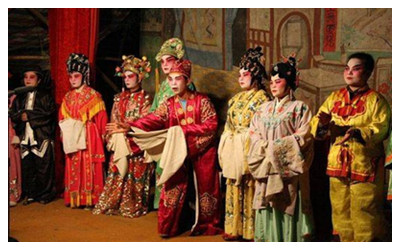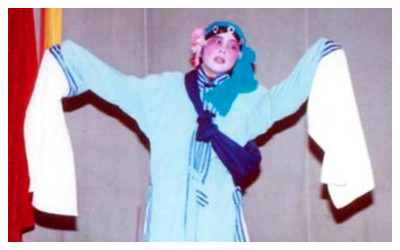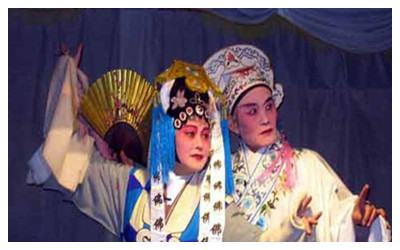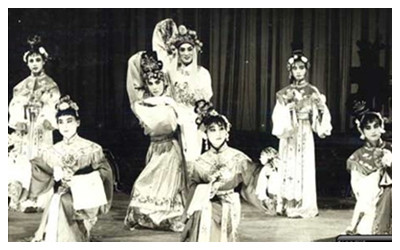Skype: neodalle-travel
Tel: +86 135 7447 2266
E-mail: sales@visitaroundchina.com
Jiangxi Opera, is one of the four oldest traditional operas of
Yiyangqiang is a bright pearl in the drama history of china. After its birth, it enchanted the whole drama platform quickly and unprecedented, leaving an unforgettable impression to us. It created a new form of Chinese drama and turned a new leaf in Chinese drama history. "Yiyangqiang" has many singing forms such as "Tuge", "Bangqiang" and "gundiao", matching with gong and drum, ardent and vehement. Its direct, bold, unconstrained and lively characteristics were very popular in hard working people. The free acting style and loud and sonorous tunes were formed in the rigorous social reality. Since Nan song Dynasty,
 Gannan Tea-picking Opera originated on Mount Jiulong, Anyuan County, Jiangxi Province over three hundred years ago. It was popular in southern Jiangxi Province, northern Guangdong Province and western Fujian Province.
Gannan Tea-picking Opera originated on Mount Jiulong, Anyuan County, Jiangxi Province over three hundred years ago. It was popular in southern Jiangxi Province, northern Guangdong Province and western Fujian Province.Guangchang Meng Opera
 Guangchang Meng Opera, dating back to the early Ming Dynasty(1368-1644), features the legend of Mengjiang Crying at the Great Wall. It was popular in Guangchang County, Jiangxi Province and is over 500 years old.
Guangchang Meng Opera, dating back to the early Ming Dynasty(1368-1644), features the legend of Mengjiang Crying at the Great Wall. It was popular in Guangchang County, Jiangxi Province and is over 500 years old.
The legend has it that 2,000 years ago, during the construction of the Wall, a young man called Fan Xiliang was forced to work on the massive project -- even on his wedding day. Before Fan went away, his bride, a girl named Meng Jiangnu, broke her white jade hair pin in two, giving her husband half as a token of her love. Meng waited for her husband for five years without a word from him. One night, Meng dreamed that her husband was yelling, "Cold, cold!" Remembering that Fan went away wearing very thin clothes, Meng made some padded clothing and set off alone to look for him.
After crossing many mountains and rivers on foot, Meng finally reached the construction site of the Great Wall where she was told her husband had died and was buried under the Great Wall. Hearing this, Meng sat at the foot of the Great Wall and started crying. She cried day and night and her wailing finally made the Wall come down, revealing her husband's bones. This made the emperor Qin Shihuang very angry, and he ordered Meng to be punished. But when he saw the young lady he was struck by her beauty and asked her to marry him. Having no choice, Meng agreed under the condition that her Fan received a proper burial. After the funeral, when Meng and the emperor went on a trip to the Bohai Sea, Meng realized that she simply could not marry the tyrant who had killed her beloved husband. Unseen by the guards Meng jumped into the sea.
The Guangchang Meng Opera had three genres. The Zeng and Liu genres are still performed now. The Meng Opera is now only performed once during the first month of the lunar calendar. The Guangchang Meng Opera aria is gaoqiang, or "high pitched music", a singing style characterized by the very high, forceful falsetto in which it is sung.
The Zeng and Liu Meng Opera genres provide precious material for the study of Chinese Opera and folk customs, and are valuable in terms of art and sociology. But it is in danger of dying out due to a lack of funds and fewer and fewer actors. Protective measures need to be taken as soon as possible to keep this piece of cultural heritage alive.
Qingyang Tune Opera
 Qingyang Tune Opera, formed in Chizhou City of Anhui Province in southeastern China during the Ming Dynasty (1368-1644AD), is also called the Chizhou Tune Opera. Qingyang Opera adds colloquial verses or short sentences that are easy to recite throughout the Chuanqi Opera, a form of drama in the Ming-Qing period that is immensely long with an average of forty or more scenes.
Qingyang Tune Opera, formed in Chizhou City of Anhui Province in southeastern China during the Ming Dynasty (1368-1644AD), is also called the Chizhou Tune Opera. Qingyang Opera adds colloquial verses or short sentences that are easy to recite throughout the Chuanqi Opera, a form of drama in the Ming-Qing period that is immensely long with an average of forty or more scenes.
A large number of repertoires of the Qingyang Opera have derived their subjects from the Southern Opera, one of the earliest operas formed in Southern Song Dynasty (1127-1279AD). The singing is accompanied by drums, cymbals, gongs and other musical instruments. There are seven roles in all, including sheng (male role), dan (female role), jing(painted-face male role),mo (the first supporting role) and chou (clown or comic role). The solos are orchestrated with a chorus. The arias are flexible and the lines are easy and plain. The actors wear various paper masks and perform acrobatics on the stage like jumping through burning rings, making the opera more exciting.
Qingyang Tune Opera has spread to many places including Fujian, Hunan, Sichuan and Shandong Provinces, directly or indirectly affecting the formation and development of operas in these places, such as Chuan Opera and Huangmei Opera. However, due to war, plague and external cultural influences, the Qingyang Tune Opera is slowly disappearing. Protective measures should be taken as soon as possible to keep it alive.
Yihuang Opera
 Yihuang Opera is a multi-tune opera. It absorbed the aria of Qinqiang, also dubbed Luantan, which is characterized by its simple, bold, exquisite and penetrating, yet exaggerated style. It originated during the late Ming and Early Qing dynasties (1368-1911). The opera is now mainly popular in Jiangxi and Fujian provinces.
Yihuang Opera is a multi-tune opera. It absorbed the aria of Qinqiang, also dubbed Luantan, which is characterized by its simple, bold, exquisite and penetrating, yet exaggerated style. It originated during the late Ming and Early Qing dynasties (1368-1911). The opera is now mainly popular in Jiangxi and Fujian provinces.
There over 500 kinds of traditional repertoires, most of which have been lost. A few examples are; A Volume of Honest and Upright Officials, Jiangdong Bridge, The Male and Female Whips and A Picture of Qingyang. The aria is very primitive and unsophisticated.
There are up to 12 roles. The performance is simple yet beautiful. For example, to show the movement of riding a horse, the performer ties a prop in the shape of a horse to his body, imitates its movement and dances to the beat of clops which is played by gongs and drums. Only in Yihuang Opera can one see such a primitive method of performance.
The Yihuang Opera, whose formation, development and decline have become the epitome of the history of Chinese opera, is an ideal specimen for the study of the laws of evolution. However, the Yihuang Opera is in danger of dying out, so protective measures shall be taken as soon as possible to keep this piece of cultural heritage alive.
 Ask Questions ?
Ask Questions ?